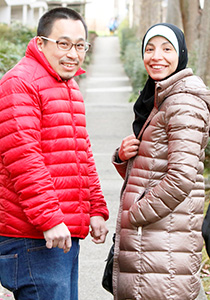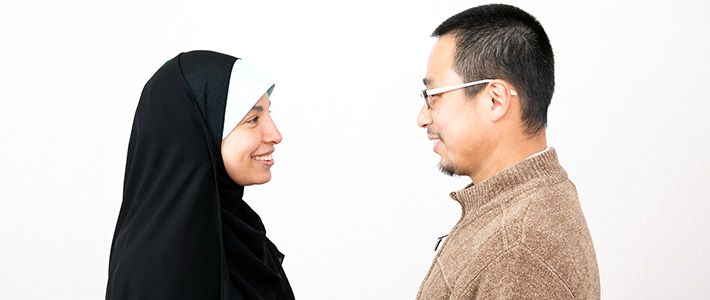
Sketches of International Marriage
Embracing Each New Day: Marriage, Japanese-Egyptian Style
Society- English
- 日本語
- 简体字
- 繁體字
- Français
- Español
- العربية
- Русский
The Egyptian Sherin Abdelsalam says she felt her life begin to move in an unexpected direction shortly after she met her future husband, Suzuki Hirotaka Yusuf, in September 1999 while the two were studying at Cairo University. Hirotaka, a student at Takushoku University in Tokyo, had just arrived for a year abroad when a friend introduced the two in the hallway of the literary department, where Sherin was majoring in Japanese. Using a favorite phrase to describe the fateful encounter, she says: “When God opens a path before you, you must do all you can to follow where it leads.”
An Unassuming Courtship
Sherin initially took up Japanese on the advice of her father, but admits she was not as diligent in her studies as she could have been. This situation dramatically changed after meeting Hirotaka, however. Desiring to communicate with her new friend, who knew only very basic Arabic and spoke English only slightly better, Sherin hit the Japanese books with fresh zeal. She is quick to stress, though, that her motivation in these early days was not Cupid’s arrow but exasperation at the language barrier.
Family members, on the other hand, were not convinced. Their suspicions were confirmed when Sherin invited Hirotaka to her home to enjoy her mother’s traditional Egyptian cooking. As way of professing her innocence, Sherin says, “I merely wanted to show my Japanese friend about life in Egypt, but my grandmother and uncle, who lived with us, were convinced we were dating.”
As is often the case, though, their bond eventually blossomed into something more than friendship. Neither Hirotaka or Sherin can put an exact date on their courtship, insisting that it came about as part of the natural flow of events. Just 10 months after meeting, the couple celebrated their engagement. Although Hirotaka was nearing the end of his study abroad, he vowed to return to wed Sherin once he graduated from university in Japan. With a slight smile, he recalls that “at the time I was unaware that getting engaged is as good being married in Egypt.”
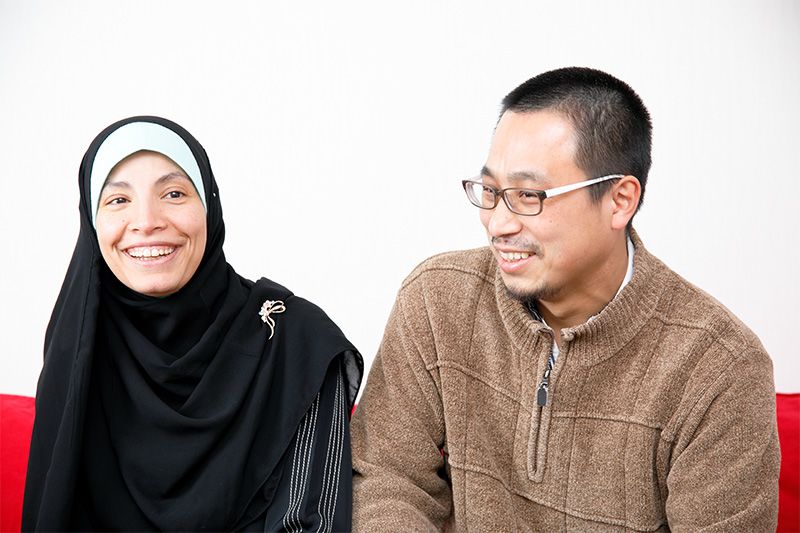 Hirotaka and Sherin say that even though they often argue, they have a strong, trusting relationship.
Hirotaka and Sherin say that even though they often argue, they have a strong, trusting relationship.
An Unexpected Turn
In the beginning, most of Sherin’s family were against the marriage, and it was only her father who offered the couple his blessing. However, a promise to settle in Egypt and Hirotaka’s conversion to Islam worked to assuage concerns, and in the end her mother and others came to accept the inevitable.
Once back in Japan, Hirotaka, knowing that the wedding was going to be an expensive affair, divided his energies between finishing school and his part-time job. “In Egypt, the groom is expected to provide a furnished home for the newlyweds to settle into,” he explains. “The only thing not his responsibility is the kitchen, which falls to the bride to prepare.”
Hirotaka says he waited to tell his parents about his engagement in person. They took the news in stride, trusting in their son’s judgement. In April 2001 Sherin traveled to Japan for the first time to meet her soon-to-be in-laws, and the following June the young couple wed in Egypt, the same evening Sherin completed her final university exam.
Settling in Cairo, Hirotaka took a position at a travel company, and in April 2003 Sherin gave birth to the first of the couple’s four children, a bouncing baby boy. Life was going along smoothly when fate abruptly intervened. Tourism to Egypt fell following the 9/11 terrorist attacks. And the subsequent decision by the United States to invade Iraq in 2003 exacerbated the situation. With a new baby to provide for, Hirotaka suddenly found himself unemployed.
A Bitter Pill
After weighing their options, the couple decided to move their young family to Japan and live with Hirotaka’s parents. While it provided a more secure and stable life, relocation came with its own difficulties. First, it meant breaking their promise to Sherin’s mother about settling in Egypt. And then there was the challenge of adapting to life in a new country. Sherin, still only 21, had never lived overseas. Although she was learning Japanese, her language skills were still developing; miscommunication with her in-laws was a frustratingly regular occurrence that added to the day-to-day stresses of motherhood. The pair eventually decided to move into their own place, about an hour away by train from Hirotaka’s family home, but to frequently return for birthdays and other family events.
While she is now used to life in Japan, Sherin admits that it is still hard to be separated from her family in Egypt. “I missed my sister’s wedding and the birth of her child,” she laments. “It was especially difficult to be so far away when my mother fell ill.” Hirotaka understands the sacrifices his bride is making and does his best to support her. He knows, however, that one spouse living away from loved ones is an unavoidable aspect of international marriage.
The couple’s hopes for returning to Egypt remain intact, but due to ongoing political and social unrest in the country following the populist revolt in 2011, their plans remain on hold.
Family Life
While the family is yet unable to return on a permanent basis, they do visit when they can. The most recent trip, their first in several years, was to see Sherin’s ailing mother in late 2016. The children spent the two weeks meeting relatives and playing with cousins. Back in Japan, they recall the widespread litter and abundant stray dogs and cats they saw, but also warmly look back on the kindness of people, which they attribute to the large size of Egyptian families.
Sherin wishes that her children could communicate better in Arabic, but understands the difficulties of passing on her mother tongue while surrounded by Japanese. “I want to teach them,” she says, “but it’s hard to find the time and energy at the end of a long, busy day. On most nights I can hardly keep my eyes open by the time I get everyone settled in.”
However, her intentions for her children to learn Arabic seem to have reached the couple’s second son, now a junior high student, who says with pride that “I was born in Egypt, so I need to learn the language.”
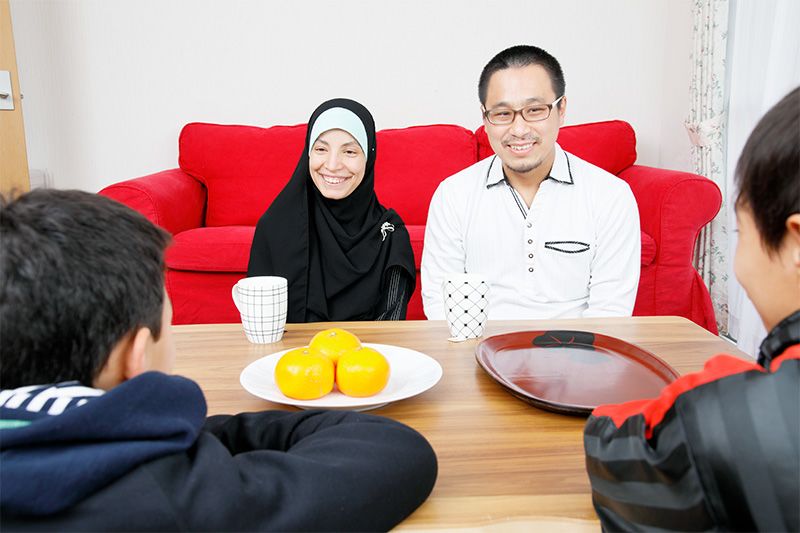 Hiroaki and Sherin hope Arabic will be a bigger part of their family’s life.
Hiroaki and Sherin hope Arabic will be a bigger part of their family’s life.
A Part of the Community
Sherin says that after 10 years living in the same area people have grown accustomed to their neighbor wearing the hijab head covering and treat her like any other member of the community. In fact, the family finds people to be very considerate of their Islamic faith.
One area where this has been most apparent is at the children’s schools. Sherin says administration and teachers have worked closely with the family to create a supportive environment: “When my second son expressed a desire to pray, they prepared a space where he could do so in privacy. Another time, teachers at an overnight camp made sure the curry for dinner was made with chicken and not pork. During Ramadan, they even set aside an empty classroom where the children can go when the other students are eating lunch. I know these measures are an added burden, but the schools have been great about implementing them.”
She is also pleased with the organization of the Japanese education system. “Japanese schools follow a clear structure,” she explains. “Class schedules and school lunch menus are readily available, making it easy for even foreign parents to stay up to speed with what is happening with their children.”
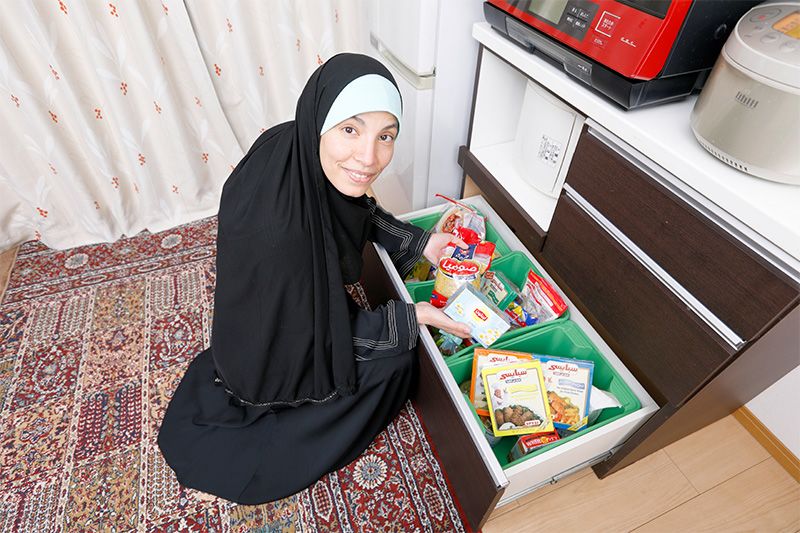 Sherin made sure to stock up on Egyptian seasonings and ingredients during her last trip home.
Sherin made sure to stock up on Egyptian seasonings and ingredients during her last trip home.
Taking It Day by Day
Hirotaka says that he was first drawn to Egypt by the dream of learning Arabic and using his language skills to link Japan and the Arab world. Providence had other plans, however, and needing to provide for his family in Japan he found employment in a field unrelated to the language. After 10 years on the job, though, he found it impossible to abandon his original goal. After discussing the matter with Sherin, he decided to resign and pursue his language studies at the Arabic Islamic Institute in Tokyo. Full of optimism, Hirotaka says he is “making a fresh start toward being a bridge between Japan and the Middle East.”
The role of breadwinner is now borne by Sherin, who humbly reconciles herself to the twists and turns that has brought the family where it is. She says the couple has learned to take things one day at a time. “Our plans to live in Egypt didn’t work out as we thought they would,” she sighs, “but that is life. To be honest, our schedules keep us busy running around from morning to night, so we have learned to live in the present.” With a smile she adds, “The most important thing is that we are happy.”
Hirotaka and Sherin Q&A
Q How did you propose?
Hirotaka asked Sherin to marry him when he came back to Egypt after graduating university.
Q What language is spoken at home?
The couple mainly speak in Japanese, but have started using more Arabic as Hirotaka’s language ability improves. The children speak in Japanese.
Q How are the chores broken up?
Hirotaka does most of the chores, but Sherin, a consummate organizer, helps by keeping dressers and other things in order. The children, to their mother’s chagrin, say they prefer their father’s cooking.
Q How does the family refer to one another?
The couple call one another Sherin and Hiro. The children call their parents Mama and Papa.
Q How often do you visit Egypt?
Once every couple of years. Most recently, the family all went back to visit Sherin’s mother over the New Year.
Q What special rules do you have as a couple?
To hug at least once a day.
Q How do you celebrate anniversaries?
The couple says they generally do not do anything special.
Q What do you do for birthdays?
Hirotaka says it is difficult to get his wife a present because she always says she does not need anything. Sherin insists, however, that she is happy with whatever he gives her.
Q What is an argument like?
Arguments can get heated, but the children say they know their parents are just blowing off steam.
Q What do you like about your husband and what is something you would like him to change?
Sherin says Hirotaka expresses his love not in words but actions, and always puts the family first. He is a born pessimist, though.
Q What do you like about your wife and what is something you would like him to change?
Hirotaka says Sherin is an optimist by nature along with being a kind, understanding person. On the other hand, she over fixates on details, so it takes her a long time to get things done.
(Based on an interview by Katō Megumi and Hassan Mohammad. Originally published in Japanese on May 19, 2017. Photos by Yamada Shinji.)